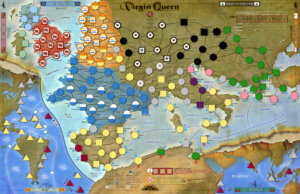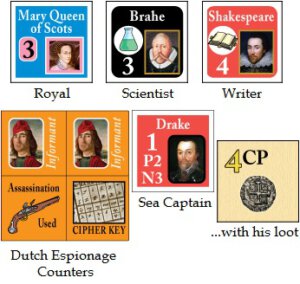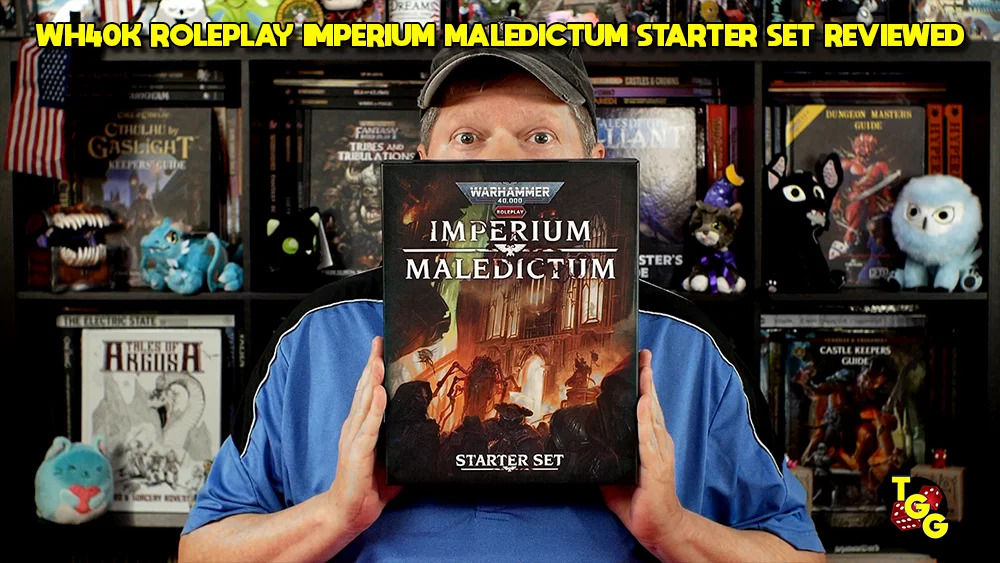
Publisher: GMT Games
Designer: Ed Beech
Artists: Charles Kibler, Rodger B. MacGowan, and Mark Mahaffey
Year: 2012
Players: Two to six players
Ages: 12+ (I certainly recommend 16+)
Playing Time: Two to eight hours
Genre: Card Driven Game of Grand Strategy
MSRP: $89.00
Many gamers have been looking forward to the release of Virgin Queen as a follow up to GMT’s popular Here I Stand. Designer Ed Beech has continued the path of the religious reformations as the time frame involved is 1559-1598 wherein the major European powers not only continued to vie for political control but religious supremacy as well. If you’re a fan of Here I Stand this is going to be a no brainer, although it isn’t a true sequel in the strictest sense, but for those who aren’t familiar with Beech’s previous game there are a few items of note to mention in order to determine if you’ll want to tackle Virgin Queen.
Upon opening the box you’ll once again be delighted by the usual GMT quality as everything is top notch. Virgin Queen is one of the heavier card driven games I’ve encountered and there are loads of various counters, of different sizes, that come into play. Storage isn’t much of an issue since GMT once again provides plenty of baggies. The map is nicely done and the cards contain plenty of historical events as well as provide loads of flavor to the game.
The game itself is designed for four to six players to get the most bang for your buck but a tutorial scenario is included for two players in order to learn the rules in a couple of hours. With a full complement of players you should find yourself with an entire afternoon or evening of gaming as playing to completion should run around eight hours or so. If it happens to be the first time the players are tackling the title, you can easily tack on an additional two hours of gameplay as you’ll be referring to the rules quite a lot.
This might be a bit more of a time investment lighter or medium wargamers will want to devote – especially during the first couple play throughs – but there’s a lot humming under the hood of the design for those looking for a meatier experience to love. The game covers a period of forty years so the scope is epic and is a grand strategy title as opposed to a traditional wargame. This means Virgin Queen could hold a lot of appeal for non-wargamers with an interest in the period, as there are battles throughout but they don’t tend to be the main focus of the game but simply another avenue to ensure your success in a quest for domination.
Players take on the role of leader of one of six major European powers: Spain, France, England, the Holy Roman Empire, the Ottoman Empire, and the Protestants (consisting of the Dutch Protestants and the French Huguenots.) Much of the action takes place in Western Europe, with capitals, cities, fortresses, under the control of major (the players), minor, and independent powers. Colonies throughout – including the Americas – come into play as well but most of the focus will be on Europe itself. Not only are spaces on the board controlled by a 
At the offset, Spain is the most powerful of the factions available as they possess quite a few overseas colonies and assets. England and France are mainly stay at home at this point while the Holy Roman and Ottoman Empires are spread across large areas of the map. The Protestant player is in the most unusual position of all: they control no territories at all as they must foment rebellion (something they and they alone may do) in order to acquire territory in which to build from in France and the Netherlands. Each power has its own unique challenges facing the owning player and no two play the same. The Holy Roman Empire, as an example, begins the game by secretly choosing the religious winner. They can look to bet on the Catholics, the Protestants, or bank on a draw while playing the game looking to hedge that bet. Talk about an interesting take on the proceedings from the HRE point of view.
As this is a card driven game, each player will receive a hand of cards in which to use each turn. The number received will be determined by the leader in power to be modified in different ways such as having possession of certain key areas. The cards (as in nearly all CDGs) contain both an event and a command point (CP) value. The CPs available are anywhere from one to five and many of the major events are of a higher value and, if played as the event, are one and done to be removed from play upon use as the event.
Players may choose to play a card for the event or the CPs depending upon what they feel might be the most advantageous use of the card at that point. Some cards are even used in combat while others as a response to another player’s card. Each faction also has what are known as Home Cards which are available to them and carry some rather powerful effects. Each turn is broken into impulses where players will play a card in order until all the players either are out of cards of have decided to pass and hold onto some of their cards. The number of cards held from turn to turn is determined by the power’s leader. Some cards indicate they must be played on the turn drawn and cannot be held over into the following turn.
Each turn begins with a negotiation phase – ten minutes are recommended – and negotiation can play a large part in who wins or loses. There are rules regarding what can and cannot be negotiated but you can work with fellow players to agree not to work against each other, loan troops, allow passage through countries, and so on. Obviously there are natural alliances that can form due to common interests (France and Spain being Catholic powers for example) but it doesn’t mean you always need to be looking out for someone else’s best interests either; you do have a nation to drive to the top by the way!
After negotiations there’s a short Spring Deployment phase, after which players begin cycling to reveal their cards. There is a vast multitude of options available to the players if they choose to use the CPs of a card. I won’t get into each and every one, as some powers have options which are specific to themselves, but here are a few of note:

Assassinate another power’s leader (isn’t that nice!)
Move units from one space to another (the game uses a point to point movement system)
Prepare an expedition to the New World
Suppress heresy
Build a galleon
Build Mercenary or Regular troops
And, many, many more!
Once all cards are played, or cards someone chooses for that turn are played while holding others, the Winter phase begins with a clean up and a check of various instances like marriages taking place, artists and scientists creating something of value, ships and troops returning home, and so forth.
A quick note about combat: There are plenty of battles that will take place in Virgin Queen but they don’t tend to be long drawn out affairs. There are two varieties of battles taking place, land and naval. For the most part, outside of sieges, you’ll roll a D6 for each strength point in your stack of units. The combat is desperate and dirty with each side totaling up their dice, play combat cards for modifiers, and rolling the bones. If the loser is not eliminated, they retreat and the winner possesses the area. If an army with a leader is eliminated, the leader is captured and ransomed back to the owning power on the next turn. Most games of Virgin Queen will have plenty of battles but it’s nice they move quickly.
A lot is new with the rule system since Here I Stand, although a good fifty percent of the system hasn’t changed. I’ll share some of these changes with you directly from the GMT site:
• Religion: Streamlined from Here I Stand, the new rules for religious conversion and rebellion allow actions to be resolved quickly, reflecting the already entrenched presence of both Catholic and Protestant factions across the key areas of religious struggle.
• World Map: Oceanic expeditions are now under direct player control as they sail to the Caribbean and beyond to seize plunder, found colonies, and attempt to circumnavigate the globe.
• Diplomatic Influence: Alliances with minor powers (and major powers that can be activated in games with fewer than six players) are now made through a unified system where players buy influence at each of these foreign courts.
• Weddings: Here I Stand’s secret negotiation phase is still present here in Virgin Queen, but with a new twist. Now you will want to arrange marriages for each of the princes and princesses of your family dynasty with a suitable foreign royal. Will even the Virgin Queen succumb to love and take a husband, or will she jilt that suitor at the last minute once again?
• Patronage: Your royal court will be visited by artists, writers, scientists, and architects, who all want you to invest in their endeavors for the glory and advancement of the realm. Will you sponsor Galileo, Cervantes, or Shakespeare or instead spend your treasury on a fruitless quest for the Philosopher’s Stone?
• Espionage: Beware! There is also a dark side to this period – a time of espionage and spymasters. In Virgin Queen you can ask your ambassadors to spy on foreign courts, send out handgun-armed assassins, invest in cryptology, and even recruit Jesuit priests for undercover missions of conversion.

As much as I enjoy Virgin Queen I do have to point out it may not be everyone’s cup of tea. This does seem to be a heavier lift than Here I Stand and much of it has to do with the fact that no power seems to play by the same rules; you almost seem to have to have a grasp of a different subset of instructions depending on who you choose to play. Taking the reins of the Protestants is vastly different than leading Spain. This does make for very interesting choices and options of how you approach your task at hand but I can see how this might not sit well with gamers who like to know, outside of differing strategies, mechanics play out the same for everyone. One thing that is bound to happen in any given session is powers will seesaw back and forth from looking as if any one of them can win the game only to see clever play by the other opponents bring the pace setter back to the pack. This game is a marathon and you must concoct your strategy toward the long haul sprinkled with bursts of activity to propel you to the win.
The time investment may turn some off as well although those coming in with a few games of Here I Stand under their belt already have an idea of what is in store, although I believe there are quite a few more small rules that pop up from time to time that require a look through the rules in order to grasp. To play the full scenario of seven turns, some groups might have to break it out over a couple of sessions or more. This might be a little much for some gamers as the game does demand a high level of focus to stay on top of all that’s going on around you.
All in all I think Virgin Queen is an excellent game though! The title provides lots of strategic options for every player to chew over as no faction plays the same as another while each possess unique advantages and drawbacks. The negotiation period makes the game even more engrossing as you’ll always be looking for ways to not only benefit your power but also your religious affiliation – unless you’re the Ottomans as they don’t have a dog in the fight and play to be a thorn in quite a few sides. If you have an interest in the period Virgin Queen is a fascinating look into the much different, and ever shifting, global view the period of history in the late 16th century.
[rwp-review id=”0″]
- Space 1999: The Roleplaying Game Receives a Free Quickstart - Apr 4, 2025
- PWYW for the Temple of the Beggar-King Adventure for OSE Advanced Fantasy - Apr 4, 2025
- Score Savings with the Feng Shui Ammo Pack - Apr 4, 2025


















